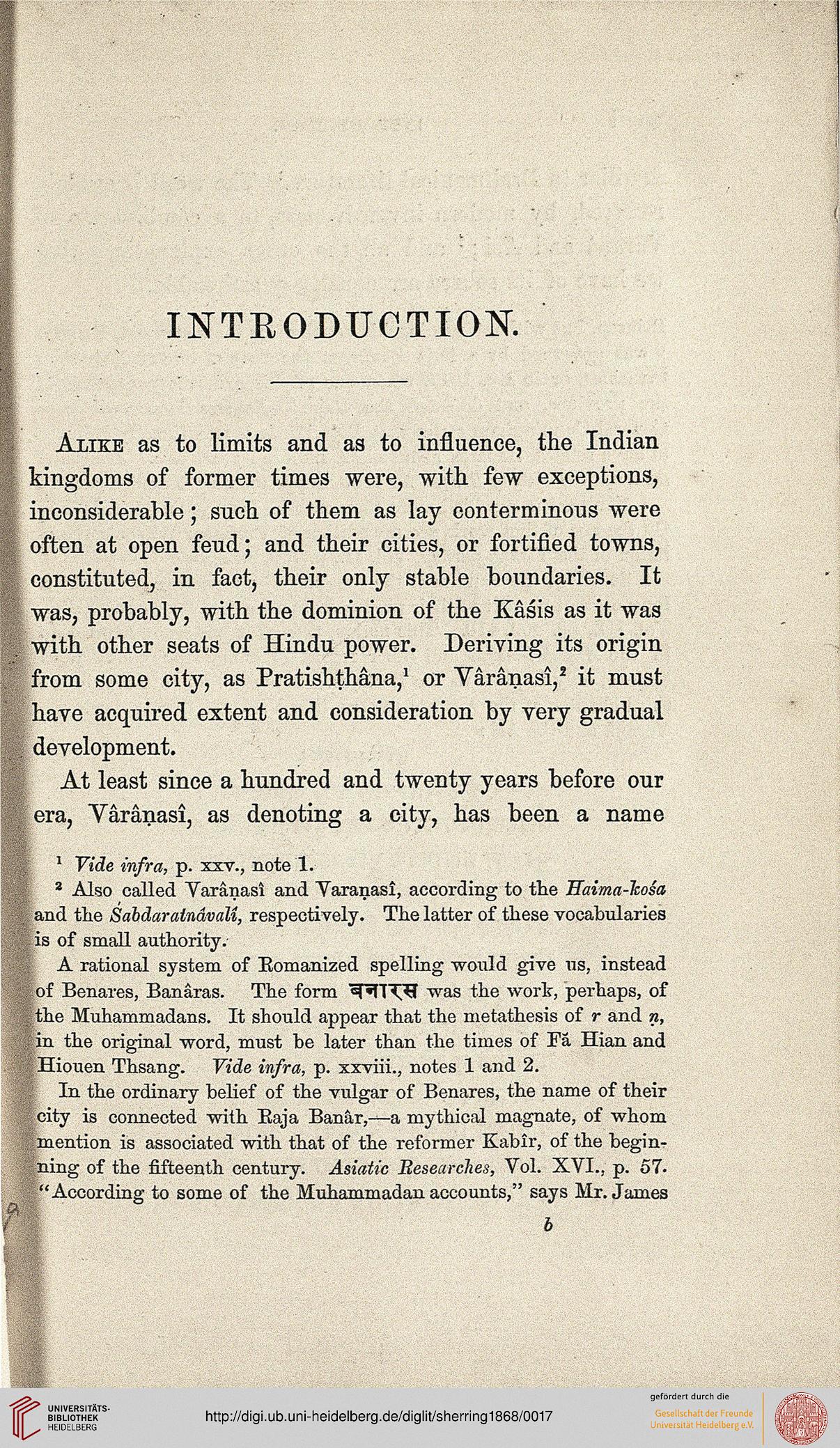INTBODUCTION.
Alike as to limits and as to influence, the Indian
kingdoms of former times were, with few exceptions,
inconsiderable; such of them as lay conterminous were
often at open feud; and their cities, or fortified towns,
constituted, in fact, their only stable boundaries. It
was, probably, with the dominion of the Kasis as it was
with other seats of Hindu power. Deriving its origin
from some city, as Pratishthana,1 or Yaranasi,5 it must
have acquired extent and consideration by very gradual
development.
At least since a hundred and twenty years before our
era, Varanasi, as denoting a city, has been a name
1 Vide infra, p. xxv., note 1.
2 Also called Varanasi and Varanasi, according to the ffaima-hosa
ad the Sabdaralndvali, respectively. The latter of these vocabularies
i of small authority.
A rational system of Eomanized spelling would give us, instead
of Benares, Banaras. The form ^TFT^if was the work, perhaps, of
the Muhammadans. It should appear that the metathesis of r and n,
the original word, must be later than the times of Fa. Hian and
liouen Thsang. Vide infra, p. xxviii., notes 1 and 2.
In the ordinary belief of the vulgar of Benares, the name of their
city is connected with Baja Ban&r,—a mythical magnate, of whom
aention is associated with that of the reformer Kabir, of the begins
ning of the fifteenth century. Asiatic Besearches, Vol. XVI., p. 57.
"According to some of the Muhammadan accounts," says Mr. James
b
Alike as to limits and as to influence, the Indian
kingdoms of former times were, with few exceptions,
inconsiderable; such of them as lay conterminous were
often at open feud; and their cities, or fortified towns,
constituted, in fact, their only stable boundaries. It
was, probably, with the dominion of the Kasis as it was
with other seats of Hindu power. Deriving its origin
from some city, as Pratishthana,1 or Yaranasi,5 it must
have acquired extent and consideration by very gradual
development.
At least since a hundred and twenty years before our
era, Varanasi, as denoting a city, has been a name
1 Vide infra, p. xxv., note 1.
2 Also called Varanasi and Varanasi, according to the ffaima-hosa
ad the Sabdaralndvali, respectively. The latter of these vocabularies
i of small authority.
A rational system of Eomanized spelling would give us, instead
of Benares, Banaras. The form ^TFT^if was the work, perhaps, of
the Muhammadans. It should appear that the metathesis of r and n,
the original word, must be later than the times of Fa. Hian and
liouen Thsang. Vide infra, p. xxviii., notes 1 and 2.
In the ordinary belief of the vulgar of Benares, the name of their
city is connected with Baja Ban&r,—a mythical magnate, of whom
aention is associated with that of the reformer Kabir, of the begins
ning of the fifteenth century. Asiatic Besearches, Vol. XVI., p. 57.
"According to some of the Muhammadan accounts," says Mr. James
b




